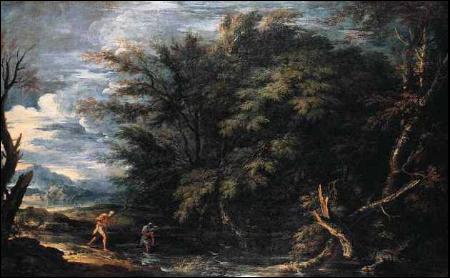
By Permission of the National Gallery, London

By Permission of the National Gallery, London
The reference is to National Gallery Number 84, Mercury and the Woodman, by Salvator Rosa bought in 1837 for the considerable sum of £1680 (as points of comparison Jan van Eyck's Arnolfini Portrait cost £630 in 1842, and Giovanni Bellini 's The Doge Loredan cost £630 in 1844).
The subject is taken from Aesop. An honest woodman lost his axe in a stream. He admitted that his was not the golden or silver axe that the god, Mercury, offered to him, and so was rewarded with a golden axe. The dishonest workman threw his axe in the water but was given nothing when he claimed the golden axe as his own. Salvator Rosa's chooses to illustrate the dishonest woodman. His pessimistic view of human nature is a factor in Ruskin's later judgements of Rosa's moral character.
Cook and Wedderburn, Works, 3.641 quote a letter of 23 September 1843 from Ruskin to The Weekly Chronicle replying to a review which had appeared on 13 September 1843. The critic of the Chronicle had written that the rocky mountains in this picture:
are not sky-blue, neither are they near enough for detail of crag to be seen, neither are they in full light, but are quite as indistinct as they would be in nature, and just the colour.
Ruskin replied:
With respect to Salvator's Mercury and the Woodman, your critic has not allowed for the effect of time on its blues. They are now, indeed, sobered and brought down, as is every other colour in the picture, until it is scarcely possible to distinguish any of the details in its darker parts; but they have been pure and clean, and the mountain is absolutely the same colour as the open part of the sky. When I say it is "in full light," I do not mean that it is the highest light of the picture, (for no distant mountain can be so, when compared with bright earth or white clouds), but that no accidental shadow is cast upon it; that it is under open sky, and so illumined that there must necessarily be a difference in hue between its light and dark sides, at which Salvator has not even hinted.
Salvator Rosa 1615-73
Landscape with Mercury and the Dishonest Woodman c.1650
Oil on canvas, 125.7x202.1cm
Provenance: Palazzo Colonna, Rome, 1783; bought, 1837
Collection: National Gallery, London